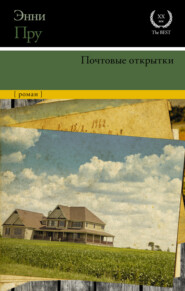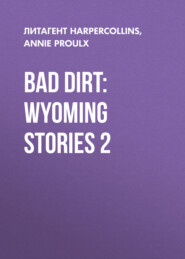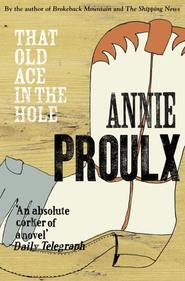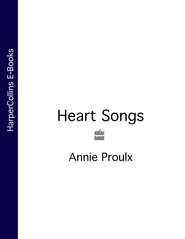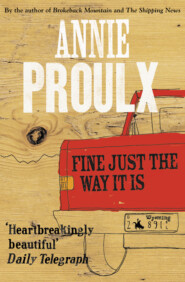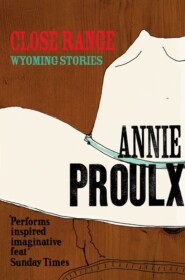По всем вопросам обращайтесь на: info@litportal.ru
(©) 2003-2024.
✖
Postcards
Автор
Год написания книги
2018
Настройки чтения
Размер шрифта
Высота строк
Поля
‘You give a guy a ride and he takes off. What the hell, give me two of them sandwiches. Give me one of the ham and a tuna.’
‘Ain’t tuna. Chickun salad.’
‘Yeah. Give me one of each of them. Two pieces of cake. You got Dr. Pepper?’ He’d feed the Indian, then get rid of him. No hard feelings that way.
The thin man wiped his hands on his apron and slowly laid the sandwiches in a white bag. He wrapped the slices of cake in waxed paper. He rang it up on an ornate old cash register that must have been in the café since Woodrow Wilson, Loyal thought.
‘Come to one sevendy.’
Loyal reached into his right pants pocket for his money and as be did he knew why sly sailor Weener had disappeared.
‘The son of a bitch took my money. He fucking robbed me.’
The thin man took the wrapped pieces of cake and the sandwiches out of the bag. He shrugged, not looking at Loyal.
The Indian was still in the backseat, his head down, intent. Reading something.
On the sidewalk Loyal plunged his hands into all his pockets feeling again and again for the thick wad of money, most of the six hundred dollars he’d saved over the winter, the grubstake, the new start, his traveling money. It was gone. He got into the car throwing himself back against the seat. The Indian looked up.
‘You know what he done? The sailor? Picked my pocket. He got away with all my money. He must of got it right after I paid for the gas. I worked in a stinking factory all winter for that money.’
After a minute the Indian said, ‘Never to keep more than a five spot in your pocket. Never keep all your money in one place.’
‘Oh, I ain’t that dumb. He didn’t get every penny. I got a hundred in my shoe, but he got all the rest. I could of lived a year on what he got away with.’ He looked up the street in the direction the Indian said Weener had taken. ’Anyway, I know where to find him. He told me he’s headed for his place in a little town up past Wadena, Leaf Falls. That’s where his wife lives.’
‘Leaf River, you mean,’ said the Indian. ‘But he don’t come from around here. Didn’t you hear how he talked? Not from around here. He told me he’s on his way to see his girlfriend in North Dakota. Said he had a letter she’s been real sick, but he thinks she got knocked up so he’s going to find out. He says.’
‘Thief and liar,’ said Loyal. ‘I bet you anything he’s not in the Navy, either. Probably stole that sailor suit. Just a thieving, lying bum on the drift. Probably stole that sailor suit. If I find him he won’t never tell another lie because I’ll rip his tongue out. I’ll take his brain out through his nose.’ He started the car and drove slowly up and down the streets of Little Falls, stopping and running into stores, the Black Hat Bar, the feed store, asking if anyone had seen the sailor. The Indian sat in the backseat, his index finger in the folded notebook. The heat was building up. The sidewalks slowly emptied, people drifting inside to cool shade, to sit on kitchen chairs and the old couches covered with pastel bedspreads.
The streets petered into empty dirt roads. At the end of a short lane they saw a sign LINDBERGH PARK. Loyal pulled in under the trees and shut the engine off. He leaned his head back and closed his eyes. His hands and feet were swollen. The sweat trickled down the sides of his face, from the hairline down in front of his ears. The wind stirred and stirred. In the aspen grove the trees swayed, hissing like heavy surf on sea stones. The Indian began to sing.
‘You think this is funny?’ shouted Loyal. ‘You think it’s something to sing about to see a man robbed and trying to get his money back?’
‘I’m singing The Friendly Song. It goes “The sky loves to hear me.” I want to be friendly with the sky. Look over there.’ He pointed to the southeast where the sky was a bruised blue with purple swellings like rotten spots in peaches. Loyal got out of the car. In a minute the Indian, singing under his breath, got out as well. The aspen leaves, green wet silk, tore loose from the trees. The Indian caught a cluster, rubbed the new leaves, as soft as the thinnest glove leather, between his thumb and forefinger.
The wind strengthened in logarithmic increments as they stood watching the sky. The clouds churned, their undersides studded with globes the color of melon flesh. A spatter of rain and branches hurled down, and something twisted in the wet grass with a doomed persistence. It was a bat, injured in some way, gnashing its needle-like teeth. Hail pelted the bat, stung their arms and rattled on the car roof like thrown gravel.
‘See that,’ said the Indian, pointing. A monstrous snout dangled from the cloud. There was a howling roar. The yellow air choked them.
‘Tornado,’ said the Indian. ‘The sky loves to hear me,’ he bawled. The snout swayed like a loose rope and came across the immense landscape toward them.
A setting moon as white as a new time shone in Loyal’s eyes. Enormous toasting forks loomed over him. He heard the cries of geese flying north. He thought he was on the farm, crushed under the stone wall and stretched out his hand to ask Billy to help him.
With the morning light people came. They lifted him in a blanket and laid him on a mattress in the back of a pickup truck. Someone put a paper bag on his chest. On the way to the hospital, the wind of passage beating coldly on his bare feet he began to move his right hand painfully. After a long time he brought it to his head and felt the wet pulpy mass. There was something in his left hand. Hard, smooth, like a blunt cow’s horn. But he could not find the strength to bring it up where he could see it. The trees flared above like flames and the ocarina fell from his hand.
‘A tornado can do freakish things,’ said the doctor. He leaned at Loyal. The close hair stubbled a head that resembled a truncated cone, ears like cupped hands. An ugly son of a bitch, yet the brown eyes behind cow’s lashes were kind. ‘You hear about straws driven six inches into a burr oak and houses shifted two feet without breaking a teacup. In your case it seems to have taken your car and pulled off your shoes and stockings as neat as could be. You’re lucky you weren’t in that car. We’ll probably never be sure exactly what injured you, but in a manner of speaking, you’ve been partially scalped.’
There was no sign of the Indian.
9 What I See (#ulink_84e96569-511b-5485-b7e1-7c76a35d70c7)
Loyal, going along the roads, the shadows of white poplars like strips of silk in the wind; pale horses in the field drifting like leaves; a woman seen through a window, her apron slipping down over her head the hairnet emerging from the neckhole, the apron faded blue, legs purple mosquito bites no stockings runover shoes; the man in the yard nailing a sign onto a post; RABIT MEAT; a plank across Potato Creek; a swaybacked shed, the door held closed with a heavy chain, white crosses, windmills, silos, pigs, white poplars in the wind, the leaves streaming by as he drove. A fence. More fence. Miles and miles and miles of fence, barbwire fence. Three girls standing at the edge of the woods, their arms encircling masses of red trillium, the torn root bulbs dangling. Sigurd’s Snakepit, OVER 100 LIVE SNAKE’S SEE THE GILA MONSTER 7 FT. ANACONDA COTTON MOUTH COACH WHIP BULL SNAKE’S RAT SNAKE, and old Sigurd in his long, long overalls and his leather coat standing, beckoning, calling, with a bull snake around his neck, his mouth flickering with promises. A Boston fern in the window. A sofa on the porch. A newspaper on the sofa. A man sleeping under a tractor in a black strip of shade. U.S. POST OFFICE. Take Home Kern’s Bread. Black oak, shellbark hickory, shagbark hickory, black walnut, black maple, Kentucky coffee tree, highbush blackberry, Appalachian cherry, chinquapin oak, moss, winter grapes, creeping savin, white pine, a burial mound in the shape of a bird, white cedar, spruce, balsam, tamarack, prairie chickens. Seed clover. A cow lying in a sea of grass like a black Viking boat, a table with a white cloth under an apple tree and at the table a shirtless man with a mahogany face and soft white breasts.
In a diner the painted wooden tables, each place set with a paper napkin, the fork resting on the napkin, to the left a spoon and a knife and an empty water glass. The simple menu is held up by the salt and pepper shakers. Clouds shaped like anteater tongues, like hawk tails, like eraser bloom on a chalkboard, like vomited curds. The ray of the flashlight in the darkness. Wet boulders along a lakeshore.
10 The Lost Baby (#ulink_87c5a860-166d-5215-a5bf-2d7e3de0365e)
MERNELLE HAD ALMOST reached the blueberry swamp, had just come to the first bushes, smelling the sourness of the place, the sun drawing scent from the leathery leaves, from the blue dragonflies and her own mucky footprints, when she heard Jewell’s voice calling, too faint to understand the words which sounded like ‘solo, solo,’ drawn out and mournful.
‘What!’ she shrieked, and listened. Only the faint ‘solo’ floated back, in a long-drawn, hollow tone. It could not be her name. Her name, called from a distance, sounded like ‘burn now, burn now.’ She stepped into the blueberry bushes and picked a few. They were still tinged with purple and sour. She squinted at the sky remembering the dusky brass color it had taken in the eclipse a month ago, though the sun had stayed visible and white. She had been disappointed, had hoped for a black sky with a flaming corona burning a hole in the darkness of midmorning. No such luck. The mournful call came again, and she stripped a handful of berries and leaves, chewed them as she climbed the hill back to the house and only spat them out at the fence.
She could see Jewell in the yard under the pin cherry tree, her white arms go up, hands raised to her mouth, calling, calling. When Mernelle came into her sight line she beckoned her to run.
‘The War is over, President Truman’s been on the radio and a baby is lost. Ronnie Nipple just come by for help. They want us to come help ’em look. It’s his sister Doris’s baby. And wouldn’t you know Mink and Dub is down talking to Claunch about selling off some more of the cows. It makes me mad I can’t drive. There sits the car and we have to walk right past it. Doris is visiting for a week, and this is the first day and look what happens. Seems they was all so tied up with listening to the radio tell about the Japs surrenderin’ and people goin’ hog-crazy wild, they’re dancin’ and screamin’, so that nobody saw the little boy, he’s just a toddler, little Rollo, you remember they brought him over one day last summer before he could walk, nobody saw him go outside. Ronnie, of course, blaming everybody, yelling at his sister, “Why didn’t you keep an eye on him.” They never did get along. So I told him we’d start walkin’ when I got you out of the blueberries and he said if he saw us on his way back from Davis’s he’d pick us up. Davis got a phone.’
‘Hooray, we don’t have to collect fat any more, or tin cans and used clothes to take to church. But they probably won’t need the milkweed pods any more, either.’
‘Guess so. And the gas rationin’ ought to ease off right away, they say.’
‘It didn’t sound like you were calling my name. It sounded like something else.’
‘I hollered “Rollo.” Thought if he’d got this far he could be somewhere in the bushes. But I guess not.’
‘Ma, it’s two miles.’ The strength of it took over the afternoon. Perhaps a baby had to be lost to end the War.
They walked through the August afternoon. The town truck had spread new gravel on the road a few days earlier and the loose stones and pebbles pressed painfully through their thin-soled shoes. Far away they could hear the hoots and blares of sirens, horns, bells, the booms of shotguns fired into the air from the farms along the ridge sounding like planks dropped on lumber piles.
‘One thing they said on the radio was that sewing machines and buckets and scissors will be in the stores pretty quick. Can’t be quick enough for me. I’m sick of using those scissors with the broken blade, twists everything you try to cut.’ Bees mumbled through the goldenrod growing along the fence lines. With a rush of feet and rapid panting the dog caught up with them, trailing his rope.
‘That miserable dog,’ said Jewell, ‘I thought I tied him up good.’ A sense of being too late hung in the dusty goldenrod. The steady grill of crickets burred in the gaping field. Grasses pointed like lances.
‘He can help look for the baby. Like a bloodhound. I’ll hold onto his rope.’ She thought about Rollo lost in the goldenrod, pushing at the stalks with weak baby hands, the air around him laced with bees, or deep in the gloomy woods the little face wet with hopeless tears, imagined the dog nosing along the leaf mold, then straining forward as he did when he picked up rabbit scent, pulling her after him, heroically finding the baby. She would carry him back to his mother through the snowstorm, the dog leaping up at her side to lick the baby’s feet, and she would say ‘Well, you’re lucky. Another hour and he’d be gone. The temperature’s going down to zero,’ and Doris crying gratefully and Mrs. Nipple rummaging in her nest egg money and handing Mernelle ten dollars, saying, ‘My grandson’s worth a million to me.’
‘I can’t believe we are walking on these rocks when there is a perfectly good car sitting in our yard and I can’t drive it. My lord it’s hot. You better learn to drive a car Mernelle soon’s you can so you don’t get stuck on a farm. I wanted to learn years ago but your father said no, still won’t have it, no, doesn’t like the idea of his wife drivin’ around. Besides, then we had that Ford that started with the crank, he said it was enough to break your arm to wind the starter up.’
The lane to the Nipples’ place was smooth and hard with a strip of thin grass up the middle. The maples threw a breathless shade. Old Toot Nipple had tapped the trees each March, but Ronnie didn’t make syrup and said he’d cut them all down for firewood one of these days. In the winter when the ice storms broke big limbs down into the lane he swore he’d do it the next good day. And never did.
‘Ma, say the counting thing, the way your grandfather used to count.’
‘Oh, that old thing. That was his way of counting sheep, the old, old style of counting. He used to count the sheep out. See if I can remember it. Yan. Tyan. Tethera. Methera. Pimp. Sethera. Lethera. Hovera. Dovera. Dick. Yan-a-dick. Tyan-a-dick. Tethera-dick. Methera-dick. Bumfit. Yan-a-bumfit. Tyan-a-bumfit. Tethera-bumfit. Methera-bumfit. Giggot. There! That’s as much as I ever knew. Up to twenty.’
Вы ознакомились с фрагментом книги.
Приобретайте полный текст книги у нашего партнера:
Приобретайте полный текст книги у нашего партнера:






